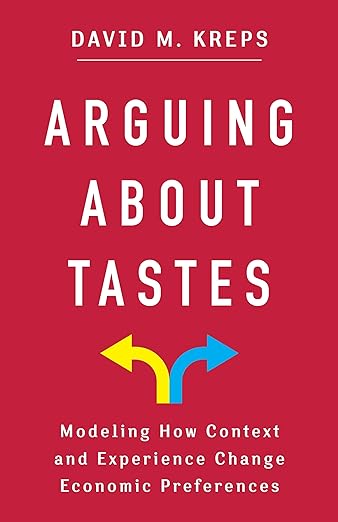Arguing about tastes
modeling how context and experience change economic preferences
- ISBN: 9780231209915
- Editorial: Columbia University Press
- Fecha de la edición: 2023
- Lugar de la edición: New York. Estados Unidos de Norteamérica
- Encuadernación: Rústica
- Medidas: 23 cm
- Nº Pág.: 202
- Idiomas: Inglés

Gary Becker once wrote a periodic column for Business Week, and, in the December 29, 1997 issue, his column was entitled "Why Every Married Couple Should Sign a Contract." Becker argues, roughly, that marriage, a complex contractual arrangement (subject to dissolution), should be fine-tuned to the circumstances and desires of the two parties, assuming their beliefs and preference are static. In lieu of defaulting to one-size-fits-all divorce law, Becker argues, it is better to take matters in to your own hands and craft a detailed agreement best suited to you and your partner. And, to deal with the objection that one party might take the mention by the other of such an arrangement as a signal of . . . something less than romantic love, Becker says that making such an arrangement mandatory will defeat this signaling problem. But is this premise-that negotiating a prenup will have no impact on preferences-reasonable? David Kreps instead seeks to challenge this assumption, and indeed in a broader sense, the principle of orthodox economics that de gustibus non disputandem est, there is no arguing about tastes. Building on Arrow formal models of choice, preference, and utility maximization, Kreps argues that accounting for dynamic personal tastes should be a mainstream element of economics, focusing on the interaction between intrinsic motivation and extrinsic incentives, both in static situations and in more dynamic contexts. He ends with a discussion of whether or not accounting for individual preferences is good for the soul of economics.
Introduction: Gary Becker on Prenups
1. De Gustibus Non Est Disputandum: The Mainstream Economic Account of Individual Behavior
2. Intrinsic Motivation
3. Internalizing the Welfare of Specific Others
4. Two (or Three) Heterodox Books
5. Choice, Preference, And Utility in Dynamic Contexts
6. Some (Social) Psychology: Self-Perception and Attribution Theories
7. Intrinsic Motivation Undermined by Extrinsic Rewards?
8. Why Are "Social Promises" Unsecured?
9. The Quality of Kreps's Performance Matters as Well
10. Intrinsic Motivation to Do What, Exactly?
11. Internalization of the Other Party's Welfare
12. Dynamics Based on Bem's Self-Perception Theory
13. Should Economists Move in These Directions?
Commentary, Joseph E. Stiglitz
Commentary, Alessandra Casella
Response to the Comments Of Professors Stiglitz and Casella









